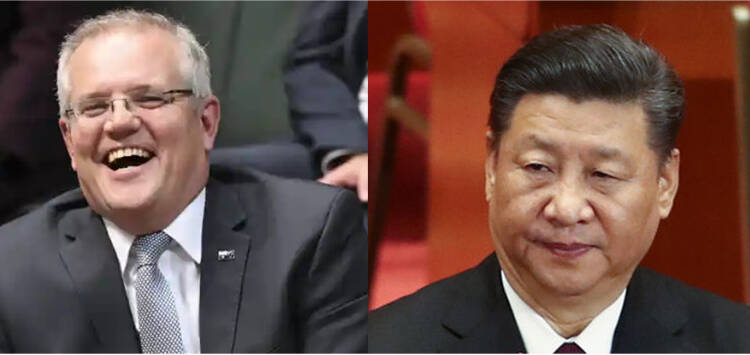China unofficial ban on Australian Coal is ‘causing self-inflicting wounds.’ After having forced to let his cities go dark and industries to shut off, Xi Jinping is all set to let Australian coal back in.
After Trump’s departure, Xi Jinping would’ve hoped that the Australian Prime Minister would relent on China’s animosity and would offer an apology. Instead, Scott Morrison refused to budge. He emboldened Australian patrolling in the South China Sea, criticised China on Hong Kong, and stopped the import of goods from China’s Xinjiang region. Moreover, he refused has not engaged in negotiation with China to rescind the coal ban. Now, China needs Australian coal and is ready to accept defeat.
China is under pressure to drop its ban on Australian coke coal and copper concentrates through a fall in the availability of high-quality raw materials, analysts have said.
Since October, steel mills have been using either higher-cost coal, of similar quality from countries like the United States, Russia, Canada, and Mongolia or lower quality coal from own mines and other sources, following an unofficial ban on Australian coking and thermal coal.
Pressure has mounted on profit margins of steel mills, while concerns about low steel yield quality have increased due to the use of cheaper coking coal.
According to Fastmarkets, a pricing and research group, several local mills and traders have recently appealed to their local governments for relief from the Australian coal ban.
A further unofficial ban on imports of copper from Australia, which was enforced in November, could also begin to backfire. The production and transportation of copper by key producer Peru continue to be disrupted.
Peruvian mines have been blocked by local activists’ groups. Blockades in the Velille district of Peru’s Chumbivilcas province disrupted copper concentrate flows from the Chinese-controlled Las Bambas copper mine,
When asked on the Australian Coal ban situation, Ministry of Commerce spokesman Gao Feng said: “The current difficult situation in China-Australia relations is not what China wants to see.”
“A healthy and stable China-Australia relationship is in the common interests of both countries. It is hoped that Australia will do more things that are conducive to mutual trust and cooperation between China and Australia, and push China-Australia relations back on track at an early date,” he said.
But China’s hand could be forced in time, said Atilla Widnell, managing director at Navigate Commodities.
“High-quality coking coal supply is essential to support a stable and uniform reduction of the blast furnace iron burden,” Widnell said.
“Most Chinese coke ovens have limited tolerance for using Mongolian and other semi-soft coking coals. Without the use of high-grade premium hard coking coal, Chinese metallurgical coke batteries and output will deteriorate over time.” Using low-grade coking coal could lead to the production of brittle steel products, he added.
Earlier, China deprived of good coking coal had accepted 70 cargo ships worth of Australian Coal which have been sitting at its harbour.
Xi has annihilated coal-based industries in China through a ban on Australian coal. The ban has proved counterproductive for China. The Communist nation’s power sector, as well as the steel industry, is suffering because of Xi Jinping’s overambitious attempts to punish Australia.
With supplies for higher quality raw material exhausting, Xi Jinping would be forced to rescind the ban. In what started as an unofficial ban to punish Australia has now turned into a major embarrassment for China. Australia stood its ground, unrelentingly and China has been forced to accept defeat.
